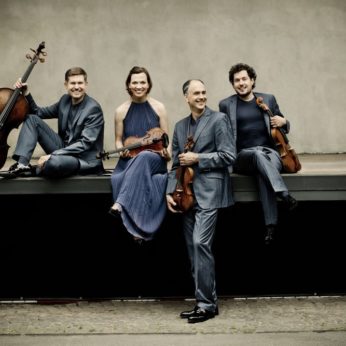Composer: Franz Schubert (b. 1797 - d. 1828)
Performance date: 27/06/2022
Venue: Bantry House
Duration: 00:10:07
Recording Engineer: Eduardo Prado, Ergodos
Instrumentation: 2vn, va, vc
Instrumentation Category:String Quartet
Artists:
Signum Quartet (Florian Donderer, Annette Walther [violins], Xandi van Dijk [viola], Thomas Schmitz [cello]) -
[String Quartet]

Franz Schubert [1797-1828]
Quartet Movement in C minor D.703
Allegro assai
This tantalising movement, dating from 1820, gives us the first glimpse of the power of Schubert’s mature chamber music. He had already written eleven quartets but nothing that approached the extraordinary power of this solitary fragment. Schubert was only 23 when he wrote this riveting movement and his composition style was developing at an extraordinary rate, although he was clearly still having trouble with larger works for the following year he began and never finished two symphonies. The famous ‘Unfinished Symphony’ dates from the year after that, 1822. In each case posterity finds it hard to understand how such masterly fragments could have failed to drive their composer on to completion.
The movement is at once intense, eventful and compact. Schubert enters a new emotional world, glimpsing many facets of anguish in a few pages of concentrated, tightly knit music. The agitated first theme gives way to more consolatory lyrical ideas, but the initial momentum is never lost sight of, and the powerful return of the volatile opening at the end sets the seal on a circular unity. The hyperactive opening idea, unprecedented as a first subject in a sonata-form work, leads off like some intense scherzo, gathering the four players in turn on the way to its far-flung climax chord. The quixotic change from the intense, agitated first presentation to the slightly more contained unrest of the second presentation is quickly followed by the gentle beauty of the second subject. A further theme combines melodic simplicity with harmonic poignancy so tellingly that he assigns his special ppp marking to it. Such are the mesmerising materials of this deeply felt, perfectly formed movement. What gives this music its impact is not just the force of craftsmanship and mature judgement, but the sheer quality of the passion that drives it.
He began a second movement but broke off after forty bars. We shall never know why.
Francis Humphrys
Copyright © 2024 West Cork Music. All rights reserved.
Designed and developed by Matrix Internet